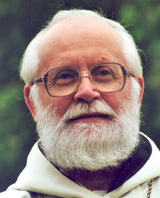 |
|
||
|
|
|||
May 7, 2011 --- 3rd Sunday of Easter Acts 2, 14. 22-28; 1 Pt 1, 17-21; Lk 24, 13-35 H O M I L Y ††† All the Sunday Gospels of Easter time are taken from the Gospel of John, except the one of today, which is from Luke. Luke reports three apparitions of Jesus on Easter Sunday: 1) to the women who were the first to have the courage to go to the tomb, 2) this one to the two disciples who had decided to return to their village and to their business, 3) to the Twelve who were still paralyzed by fear in the building where they had locked themselves in. ††† The meeting of Jesus with the disciples going to Emmaus has inspired many artists through the centuries.† But I think that most of the famous paintings represent Christ eating with the two disciples in the hotel dining room, rather than on the road. Personally I have always been fascinated mostly by their meeting on the road. ††† Actually, although what Luke describes here certainly has some historical foundation, he is not interested in describing a particular event. It does not take much reflection and analysis to see that Luke is describing here the life of the first Christian community going on with its normal occupations after Jesus' death and resurrection, but still experiencing his presence 1) through the preaching of the Word and Catechesis; 2) through the breaking of the bread; 3) through the profession of faith.† Luke does not relate a miracle of power but a happening that rejoices the spirits and warms up the hearts. ††† Let's try for a moment to imagine what the first Christian community (represented here by the two disciples) was experiencing after Jesus' death.† His life had been most disconcerting for them.†† There was a young prophet that had all the signs of being the Messiah; he had spoken like nobody else, he had passed doing good and working miracles; but all of that had been very short‑lived.† He had been put to death.† One sentence of the narrative expresses very well their disillusion: "We thought that he was the one..." ††† For all of us there have been times where we felt the presence of Christ in our lives.† The absolute certitude of that presence gave us the strength to make commitments, as Christians, as responsible members of the Church, as monks.† Then, times come when nothing seems to be clear and certain anymore. We feel like saying: "We thought that he was the one..." We thought it was his will; we thought he would be with us all the time.... We thought we would experience his presence.† And now it is the third day, the third month, the third year... And if someone asks us why we are so despondent, we will say: "Are you the only one around who does not see that everything is going wrong... in the church, in the world, in the community, in my life? ††† Today's gospel reminds us of the importance of remembrance, which is the most fundamental Christian attitude (Do this in memory of me...) It reminds us that every time we have the courage to say, in our moments of doubt and trial, "I thought that he was the one"...†† every time,† He is there, travelling with us on the road, warming up our hearts, opening our eyes to the understanding of the Scriptures (not only the Bible, but the Scripture of our own existence), and leading us to the sharing of the meal with our sisters and brothers, and making us recognize him in this sharing of the bread. ††† We are all Jesusí disciples.... all going to Emmaus, we are all telling each other what happened -- or what did not happen --... sharing our hopes and our disillusion at times.† Because we have the courage to do that, in memory of him; he is travelling down the road with us. He is one of us; he is each one of us; he is what each one of us must be for the other.† ....."Are not our hearts burning inside?..." |
Homily for the same Sunday in 1999
|
||
|
|
|||
